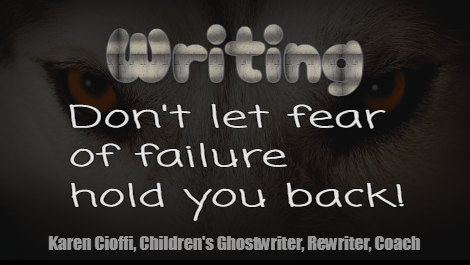
Are you struggling to start living your dreams and accomplishing your writing goals because you’re afraid you’re going to fail?
Maybe you want to be a magazine writer. Maybe you want to be a book author.
It’s a natural feeling to have doubts and fears. Even some of the most successful people fear failure. However, the difference between successful folks and those who haven’t achieved their dreams and goals is what they let fear control.
Fear of failure can hold you back or help you grow.
Accepting that fear is a natural human response, but it's only the beginning. What you do with that fear is the key to success.
If you take that fear and forge ahead regardless, you learn how to quiet your fear. This makes you stronger the next time it creeps up.
If you let fear hold you back, you condition yourself to think that fear is stronger than you are. That gives it the power to stop you from achieving any goal that feels risky.
So, What Is Fear?
It’s important to know what fear is. It’s an emotion that arises with the threat of harm, either physical, emotional, or psychological, real or imagined, to prepare your body for fight or flight.
While traditionally considered a ‘negative’ emotion, fear actually serves a vital role in keeping us safe as it mobilizes us to cope with potential danger, as in the ‘bear’ scenario. It can be life-saving if a bear is chasing you, but it’s not so useful in business.
To keep things in perspective, when you fear trying and failing, keep in mind that failure means you ARE trying. You’re taking the initiative. This is a good thing and half the battle.
If you don’t try to achieve your goals, there’s no failure. But there’s also no success.
Ask anyone who’s achieved a respected level of success how they got there, and chances are they’ll tell you it took perseverance, a lot of failures, and the determination to look failure in the eye and keep going.
No one achieves success without failing, often many times. The difference between them and others is that they have the ability to manage their fear rather than let it manage them.
7 Tips to Help Move Beyond Your Fears
There are two types of people in the world. One group dives right into the cold water while the other group must start by dipping their toe in. Well, maybe there are three types: the people who won’t even dip their toes in the water.
If you’re the toe-dipper, you may have a more challenging time controlling fear. Here are some strategies to help you take control of the reins:
Identify your fears.
Consider which situations cause you fear and how difficult each one is. You can rate them from 0 to 100, with zero being the least difficult and 100 being the most difficult.
Is submitting an article to a magazine scary? Maybe you’re worried you won’t get the gig, or maybe you’re afraid that you will. How will you manage working with an editor and a deadline? Or perhaps you’re afraid of rejection. Or even worse, being told you’re not good enough.
Is writing and submitting a book to publishers and agents terrifying for the same reasons as submitting a magazine article? What if you never get a contract?
Identify your worst fear. Then play the 'what's the worst that can happen game.'
If you're afraid of not being a good enough writer, what's the worst that can happen? Rejection? In that case, you'll have to hone your craft and keep trying.
Face your fears.
Start with the least difficult situation and put yourself in it. Allow yourself to feel the fear without distractions. The more you face your fears, the less scary they become.
Start with a guest blog post. There’s a querying phase involved, as well as guidelines. And your article may not be accepted. So, there’s some possible anxiety.
Think of it as a challenge rather than fearsome.
Practice relaxation techniques.
Still, having a fear problem? Try breathing deeply, dropping your shoulders, or imagining yourself in a relaxing place. You can also try exercises such as yoga, tai chi, or meditation.
Challenge negative thoughts.
Don't try to be perfect, and don't get trapped into thinking your current situation is all bad. Replace negative thoughts with positive ones.
Instead of thinking you can’t write that article or book, say, “I can do this!” Instead of thinking you shouldn’t even try, say, “Why not?”
Surround yourself with positivity.
Do positive self-talk and talk to people with positive attitudes and those who give you good advice.
Be honest with how you feel.
Don't deny your feelings; they’re legitimate and don't make you weak.
Accept that mistakes and failures are unavoidable.
Mistakes and failures are part of being human; you stop growing when you stop making them.
SUMMING IT UP
Whether you’re a toe dipper or a dive right in person, there is a way to manage fear of failure. Know that it’s human, it serves a purpose, and you’re stronger than your thoughts and emotions. Go out there and take a few risks!
Don’t let your fears turn a mole hill into an enormous, insurmountable mountain.

Should Picture Book Authors Create Storyboards?
A Children’s Bestselling Author – Can You Become One?
10 Difficulties Common to New Novelists

I’m a working children’s ghostwriter, rewriter, editor, and coach. I can help turn your story into a book you’ll be proud to be the author of, one that’s publishable and marketable.
OTHER HELP I OFFER:
HOW TO WRITE A CHILDREN'S FICTION BOOK
A DIY book to help you write your own children’s book.
PICTURE BOOK, CHAPTER BOOK, MIDDLE GRADE COACHING
Four to twelve-week coaching programs.
FICTION WRITING FOR CHILDREN eCOURSE
4-Weeks / 8 Sections Guided Self-Study Mentoring Program
You can contact me at: kcioffiventrice@gmail.com.
